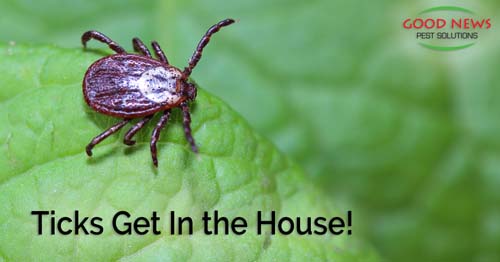
Ticks Getting Inside!
It’s a summertime ritual dog owners and campers know well – checking for Ticks after a fun outdoorsy adventure. No one wants the bloodsuckers in the house – especially when you consider that a pregnant female tick can lay between 1500-5000 eggs at a time!
But what you may not know is that ticks aren’t dormant during the winter months. And they can be very clever finding ways to get to their next meal!
A Tick-ing Clock
Ticks exist in 4-different stages of life – all of which require the vampiric blood meals they’re known for. The first stage, of course, is eggs. Laying a new brood of eggs requires the mother to devour enough blood to almost double in size. They also tend to be impregnated while on the host from which they’re drinking.
After a few months, the eggs hatch into the larval stage. These ticks are also sometimes called seed ticks, because they’re visible mostly as tiny dots that seem to be everywhere. Under close scrutiny, you can sometimes spot the 6 legs that branch out from their tiny bodies.
Larval ticks will feed anywhere from 6 months to a year before they molt into the next stage. Once they devour enough blood, they drop to the ground, transform, and look for a new host.
Nymph ticks are larger than larvae ticks and now sport 8 legs. A new host is acquired and they eat enough to become full-fledged adults, starting the cycle all over again.
What is Your Quest?
Ticks can feed on mammals, birds, reptiles, and amphibians. And most ticks prefer to have a different host animal at each stage of their life. Unlike fleas, ticks can’t jump, so they rely on ambushing behaviors to move from host to host.
Entomologists call this procedure "questing." Ticks will find a blade of grass or leaf that’s high enough, clinging to it with two of their legs. They employ an ability to sense higher CO2 levels emitted by warm blooded animals to find a host, dropping or grabbing hold as the animal or human brushes past.
Each life cycle of the tick looks for a larger and larger host to support them.
Outdoors to Indoors
Usually, it is a dog or a human that brings a tick into the house. But occasionally, nymph or larval ticks will be questing for a new host and we’ll bring the plant that they’re clinging to into the house. This is especially true in Florida, when we have so few cold days.
Once inside, the ticks can have a field day, pun intended, looking for a new host for a blood meal.
Oh, and just one pregnant tick equals an infestation!
Sickening Vectors
Because ticks are known to spread various ailments, such as Lyme disease, Rocky Mountain spotted fever, tularemia and ehrlichiosis, limiting their spread and your exposure to them is essential. As soon as you spot a tick on yourself or a household animal, remove it with tweezers. Don’t use Vaseline, oil, or alcohol to try to kill the tick. These home-brewed remedies can cause the tick’s mouth to remain in your body, which can lead to an infection. And they are resilient to crushing, so it is the norm to hit them with a match or lighter to be sure they are destroyed.
The less time the ticks feed on the host, the less chance of disease transmission.
The good news is that a keen eye and careful examination of your pets and plants before you let them into the house can keep ticks off your back. But if you do find yourself in the midst of a tick infestation, we can help.
Good News Pest Solutions offers a full-home tick treatment, in cooperation with you and your veterinarian, to eliminate ticks from your home as quickly and safely as possible.
If you think you’re experiencing a tick related problem, or want to get a quote on our full-service, risk-reduced pest control solution for the other creepy crawlies who come into Florida homes, give us a call! Our service is loved and recommended by clients from Sarasota to North Fort Myers!
« Back to BlogProudly Serving
Sun City Center, Ruskin, Palmetto, Parrish, Ellenton, Bradenton, Anna Maria, Holmes Beach, Bradenton Beach, Longboat Key, Lakewood Ranch, University Park, Myakka City, Sarasota, Siesta Key, Osprey, Nokomis, Casey Key, Venice, Englewood, North Port, Port Charlotte, Punta Gorda, Arcadia
Things You Can Do
Pay Your Bill Online
Leave Us a Review
Request a Free* Termite Inspection
Stop Mosquito Bites
Get Rid of Rodents
Get a Termite Damage Warranty
Get Pest Control for Your Attic
Get Pest Control for Your Business Request Prayer
Corporate Address
1080 Enterprise Court, Ste A
North Venice, FL 34275
Call Now: (941) 412-9610
Text: (941) 412-9610
Fax: (941) 412-0080
